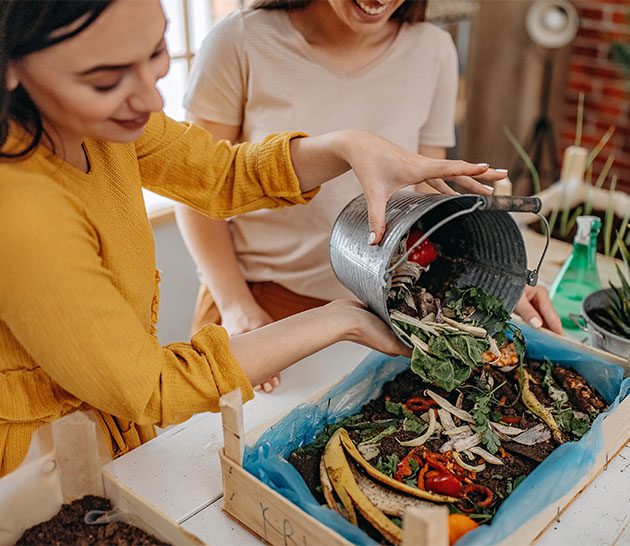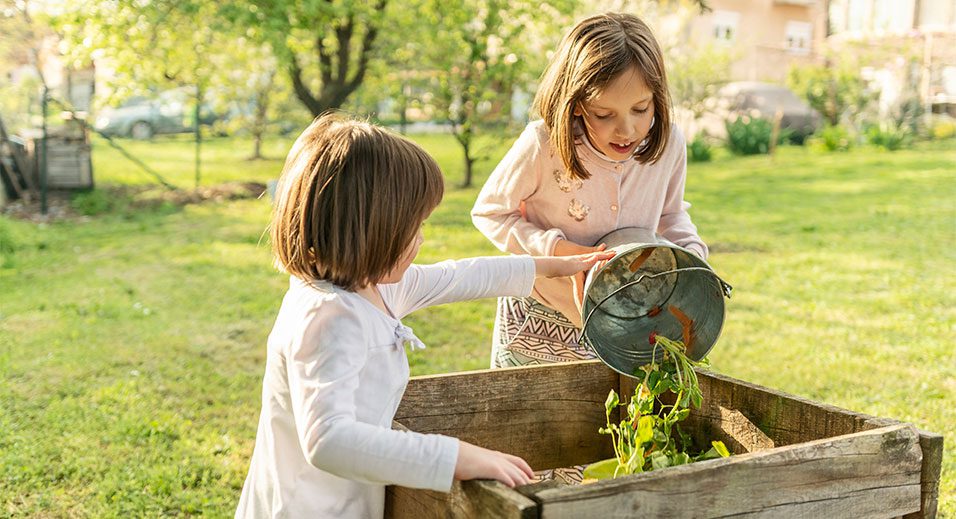Check out our comprehensive guide to composting and its benefits for the environment!
By Joe McMahan, VP, Sustainability & Shared Value
Each year, the week of May 5-11 is Compost Awareness Week! This is an annual event that aims to raise awareness around the importance and benefits of proper composting, as well as to share knowledge on the crucial role that composting plays in soil and plant health, and in environmental sustainability.
Compost Awareness Week is something we‘re recognizing at Maple Leaf Foods, because we take Our Commitments to sustainability seriously. Read on to learn how you can celebrate Compost Awareness Week at home with your family and friends this week, and all year long!
Why should you compost?
Composting is the natural process of breaking down organic matter, such as food scraps, into a nutrient-rich matter that you can add your soil. Compost can be used for gardening and agriculture, and it has many benefits for the environment, such as:
- Reducing waste: Composting helps prevent organic waste from reaching landfills, where it would otherwise release methane, a potent greenhouse gas that contributes to global warming.
- Enriching soil: Compost adds organic matter, nutrients, and beneficial microorganisms to soil, which can help improve its overall structure, fertility, and water retention.
- Enhancing plant growth: Compost promotes plant growth, health, and resistance to pests and diseases. This in turn also reduces the need for chemical fertilizers and pesticides!
- Conserving water: Because compost helps soil have better moisture retention, it reduces runoff, erosion, and water pollution.
- Cutting carbon: Compost also increases soil’s capacity to store carbon, which in turn reduces the amount of carbon dioxide that’s being released into the atmosphere.
How to compost at home, work, and beyond
Composting can be done anywhere! That’s the beauty and simplicity of composting — whether you’re at home, at work, at school, or in the community.
For kitchen scraps, here’s a guide on what can and cannot be composted:
Do compost:
- Vegetables scraps
- Fruit scraps
- Egg shells
- Bread crusts
- Any vegetarian food leftovers
- Wood chips
- Shredded newspaper
- Cut up cardboard (small pieces)
Do not compost:
- Meat (especially if you have pets)
- Dairy (butter, milk, cheese, yoghurt)
- Oil, fat, lard
- Animal bones
- Sick plants
- Anything with salt (ex: pickles)
- Peanut shells
- Cigarettes
If you compost through a municipal program, then you typically can compost things like meat and bones, but avoid these when creating your own composting system at home. When meat decomposes, it can get smelly and become infected with harmful bacteria that can contaminate surrounding plants. Make sure to read up on proper composting practices to optimize your compost bin!
Depending on the space you’re in and the materials and time available, you can try these different options for composting.
Backyard composting: If you have a bin or large container in your backyard, you can use it to compost your organic waste. With this method, make sure to balance the ratio of carbon-rich materials, like leaves, straw, and paper, and nitrogen-rich materials, such as fruit and vegetable scraps and grass clippings. Turn it regularly to speed up the decomposition process.
Worm composting: Worms are Earth’s little helpers! This method involves using a bin with red wiggler worms to compost your organic waste. Worms are super powerful in the composting process because they eat the organic matter to produce worm castings, which are rich in nutrients and beneficial for plants. This method is ideal for small spaces and apartments as it can be done both outdoors and indoors.
Community composting: You may have local programs or initiatives in your community that collect and compost organic waste from households, businesses, schools, or other institutions. Take the initiative to do a search in your municipality for volunteer groups or non-profit organizations that are running a composting program!
Turn composting into an activity with the family: We’ve teamed up with Earth Rangers to show you how you can turn composting into an activity with your kids!
Check it out here, then test your knowledge of composting with this interactive quiz!


Join the movement — spread composting awareness
Of course, composting is the best way to participate in Composting Awareness Week directly, but there are also many other ways you can join the global movement! For example, take the initiative to learn more: attend a webinar or workshop, or check out articles, books, videos, and podcasts about composting and related topics. Spread the word! Share your composting experience and knowledge with your family, friends, neighbours, co-workers, and online followers. You can share this blog or even make your own post on social media to spread awareness. You can also support the composting community by buying or donating compost, using compost in your own garden, or volunteering for a composting project.
Composting is a simple and effective way to reduce waste, improve soil, and support environmental sustainability. Choose a method that suits your needs and preferences and use the resources and tips in this blog post to get started today. Let’s celebrate Compost Awareness Week together and join the global composting community to contribute to a greener and healthier planet!

